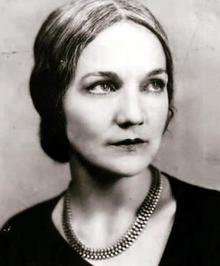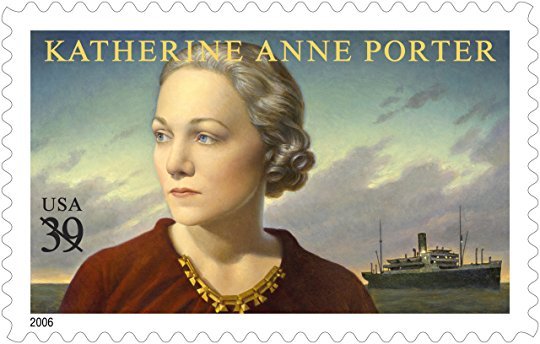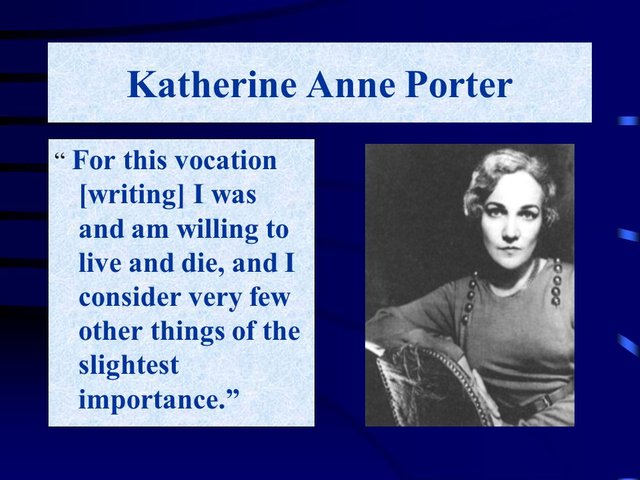Female Gender Roles in Literature (1/3)
Female Gender Roles in the Works of Katherine Anne Porter, Eudora Welty, and Richard Wright

In this essay I will discuss,
The treatment of female gender roles in the works of three authors: Katherine Anne Porter, Eudora Welty, and Richard Wright. In reading Porter’s “The Old Order” and the character, Sophia Jane, Welty’s “Moon Lake” and the girls at camp, and Wright’s Black Boy and this novel’s female characters.
I became interested in these author’s treatment of their female characters; how their female characters deal with issues of gender, and what happens when gender lines are crossed. While most female characters in these works are written as passive and submissive, once in a while I’d come across one who was active and assertive, traits that are specifically masculine. Sadly these females are desexualized being written as motherly, elderly and unattractive. Portraying women in this fashion seems to minimize the threat to men and their patriarchal hierarchy.
The portrayal of women and men’s reactions are the main topics of this essay.

Source
Sophia Jane in Katherine Porter's "The Old Order"
Sophia Jane, a character in Katherine Anne Porter’s “The Old Order” is portrayed as a woman who, in spite of her cultures mores to the contrary, crosses gender lines. When necessity calls, Sophia answers. Regardless of traditional gender roles, roles she otherwise upholds with vigor, Sophia Jane plows fields and doles out punishments both considered to be in the realm of men. It is
“…not until she was in middle age, her husband dead, her property dispersed, and she found herself with a houseful of children, making a new life for them in another place, with all the responsibilities of a man but with none of the privileges”
(Porter 22)
Sophia Jane underestimates the power of women; she does not give herself credit for what she has done, passing all her accomplishments off as done out of necessity.
“Faithful to the patriarchal ideology, Sophia Jane not only insists on making sure that in her own family both traditional gender roles are represented but also judges others according to how well they carry out these conventions”
(Frankwitz 477)
Woe be to the modern woman who chooses to take some control over her life. For instance, Sophia Jane disapproves of her daughters-in-law: one because she is too modern and the other because she is too inadequate. Neither properly carry out her gender role. One is self possessed, has her way (her wedding, her way), is too “Western,” too modern, and wishes to go out into the world to earn her own living. The other daughter-in-law is deemed inadequate because she did not keep her house in proper order, was “delicate,” and died giving birth to her third child (Frankwitz 478). Women were to be biblical, to be fruitful and multiply.
“Miss Sophia Jane and Nannie had then started their grim and terrible race of procreation, a child every sixteen months or so…”
(Porter 19)
As a consequence of this biblical view of women Sophia Jane further crosses gender lines when she openly exercises her authority over not only her own children, but those of her slave/servant Nannie.
“[Sophia]… exercises this show of authority when soon after she and Nannie have each given birth to their fourth child, she takes up the position of wet nurse for her baby and Nannie’s” (because her servant was greatly ill with perpetual fever)
(Frankwitz 477)
Female characters have control over very little except their virginity.
However the “…belief that virginity and virtue are synonymous and that they are the measurement of her worth as a woman” is countered by societies demand that females marry and provide heirs Thus, even in their virginity females characters are not in full control. Their choices are limited- become an old maid or become a wife- one wonders if this is a choice at all. Sadly female characters from Sophia Jane’s generation
“…had questioned the burdensome rule they lived by everyday of their lives, but without rebellion and without expecting an answer.”
Unfortunately, these women stopped at questioning, never challenging or demanding answers. Instead
“they dismissed the validity of their personal hesitations.. Perpetuat[ing] their own enslavement to the old order”
(Frankwitz 476)

Works Cited
Frankwitz, Andrea. “Katherine Anne Porter’s Miranda Stories: A Commentary on the Cultural Ideologies of Gender Identity.” Mississippi Quarterly 57:3 (Summer, 2004): 473-488.
Keady, Sylvia H. “Richard Wright’s Female Characters and Inequality.” Black American Literature Forum 10:4 (Winter 1976): 124-128.
Porter, Katherine Anne. The Old Order. Orlando: Harvest, 1972.
Welty, Eudora. The Collected Stories of Eudora Welty. Orlando: Harvest, 1980.
Wright, Richard. Black Boy. New York: Harper Perennial, 2006.
Yeager, Patricia S. “The Case of the Dangling Signifier: Phallic Imagery in Eudora Welty’s ‘Moon Lake’” Twentieth Century Literature 28:4 (Winter, 1982): 431-452.
)
)
)
)
https://postimg.org/image/iuanzivxx/2417092a/